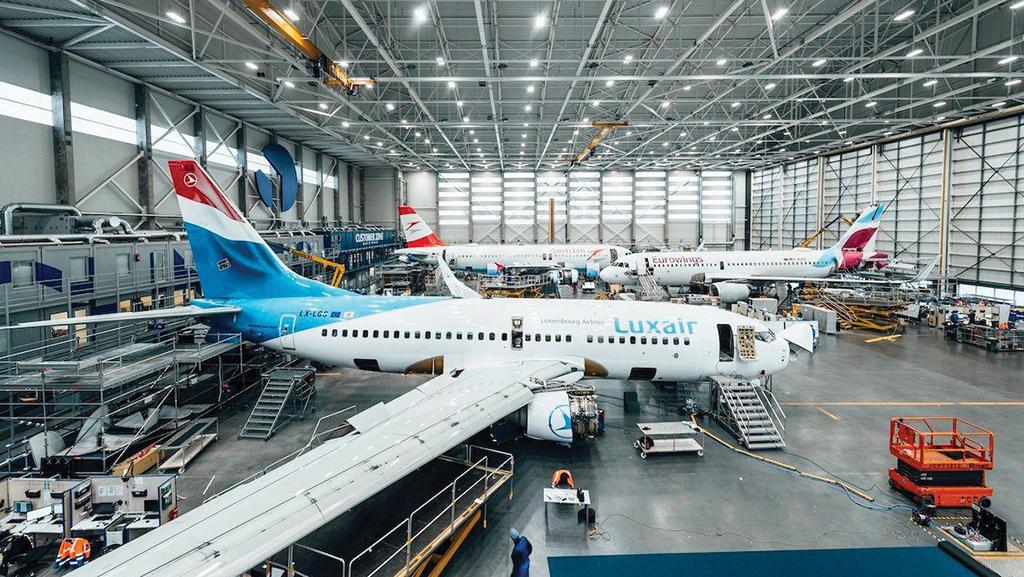
The recovery of Eastern Europe’s commercial aftermarket picked up last year and is continuing as passenger traffic comes back with the easing of cross-border restrictions and aircraft coming out of long-term storage. Aviation Week’s Commerical Fleet & MRO Forecast data confirms this recovery: This year, the region is projected to generate $4.7 billion in maintenance spending. While less than in Western Europe, the region will see a consistent and steady spending increase in 2022-31, with a compound annual growth rate (CAGR) of 2.2% annually.
As a result of the pickup so far in 2022, Eastern European MROs have bolstered capabilities and are addressing concerns that pre-dated COVID-19, such as capacity constraints and labor challenges. However, another major challenge is geopolitics due to Russia’s invasion of Ukraine in late February.
Impact of Ukraine Conflict
While disruptions were felt in the wake of the Russian invasion, the loss of MRO work from Russia and Ukraine has been largely minimal. Most MRO providers in the region do little business with Russian customers. Estonia-based Magnetic MRO says Russia accounted for around 7% of its revenues last year, while Czech Airlines Technics (CSAT) also reported minimal impact, with line maintenance most affected from both Russian and Ukrainian carriers.
Meanwhile, Lithuania-based FL Technics experienced some disruption in the first weeks of the conflict but saw a return to stability soon after. The company projects that about 10% of its revenue for 2022 will come from nearly 20 airline customers in Russia and Ukraine.
Stronger Service Offerings
Zilvinas Lapinskas, CEO of FL Technics, told Aviation Week in April that it is now looking to expand across Europe and beyond. During the pandemic, it added new offerings such as quick-turn engine services for CFM56 models, reflecting a wider trend for customers aiming to optimize their engine’s time on wing.
Now that the market is recovering, the company has set up a new wheels and brakes business operating out of Hanover, Germany. This decision was supported by logistics and a desire to be closer to customers, Lapinskas says. “Shipping parts and materials from a shop in Vilnius to other locations around the world came with costs and ate into profits,” he explains.
“We are participating in different tenders and talking to customers, as there are a lot of changes in the wheels and brakes aftermarket landscape in Europe—some are either closing after the COVID-19 pandemic or restricting their business. Some maintenance contracts are also coming to an end, and with new tenders being announced, we are participating.” He adds that the company will now look at setting up new shops and possibly acquiring new maintenance specialists.
Labor costs also remain a concern in the region, as rates have risen consistently over the past five years. Like many global regions, Eastern Europe’s aftermarket has not been immune to losing skilled workers from the sector as a result of redundancies, retirements and, increasingly, career changes. Lapinskas is not sure how this can be dealt with long-term, but he is adamant that one scenario is not viable. “We can raise prices with customers, but that won’t be a long-term option,” he says, instead suggesting greater efficiency gains from areas such as digitalization.
Other providers looking at expanding capabilities include Estonia’s Magnetic Group, which told Aviation Week earlier this year that it is seeking to expand its base maintenance services overseas. This will be in addition to growing its existing capacity at its Tallinn base and follows a busy period during which it launched an engine services business while developing several other specialist capabilities.
Capacity Ramp-Ups
Pre-pandemic, capacity constraints were a big concern, with MRO providers in the region increasing their readiness for demand ramp-ups. In early March, Aeroplex, located in Hungary, doubled the capacity of its hangars in Budapest, adding nearly 90,000 ft.2 for servicing four narrowbodies or one widebody aircraft simultaneously. This expansion required about $30 million, with the country’s government contributing nearly one- third of the cost. Already servicing the Boeing 777 and 787, the company says it expects to add A330 and A350 services at the site soon. Despite labor challenges in the region, Aeroplex is pressing ahead with plans to add up to 200 new staff at the facility.
Beyond the widebody segment, airlines such as AirBaltic are building up capacity for the narrowbody market. This year, the Latvian carrier, which also provides third-party MRO, plans to commence building a new hangar in Riga, Latvia, to focus on services for A220 aircraft. It is expected to be completed by late 2023.
Looking east to the edge of Europe, Turkish Technic has moved forward with expansion at its Istanbul Airport base, where it set up in 2019 after moving across the city from the now-defunct Ataturk Airport. Following completion of construction of its new base maintenance facilities in the Turkish capital, it added MRO services for the 787 while also making gains in the landing gear segment. The MRO provider is seeing further signs of recovery after posting full-year revenues of around $1 billion, marking growth of approximately 15.7% compared to the previous year. Mikail Akbulut, CEO of Turkish Technic, says the company hopes to rebound to pre-pandemic levels by the end of this year, although mean revenues for last year were still down by 28%.
Regional low-cost carriers are also continuing to outsource their maintenance. Hungary-headquartered Wizz Air has done this with regional providers over the past six months. Late last year, it renewed ties with Adria Tehnika for another four years. The deal will see the Slovenian MRO carry out the first inspection on Wizz Air aircraft this fall from its base at -Ljubljana Airport, where it performs airframe and component maintenance, line maintenance and on-request support, among other services.
Airlines from outside Central and Eastern Europe are also continuing to outsource to MRO providers in the region. Typically, these are low-cost airlines such as EasyJet, which agreed to send additional maintenance work to Adria Tehnika for another five years in late 2021. The MRO is contracted to provide three parallel maintenance lines for the British airline’s Airbus A320-family aircraft.





